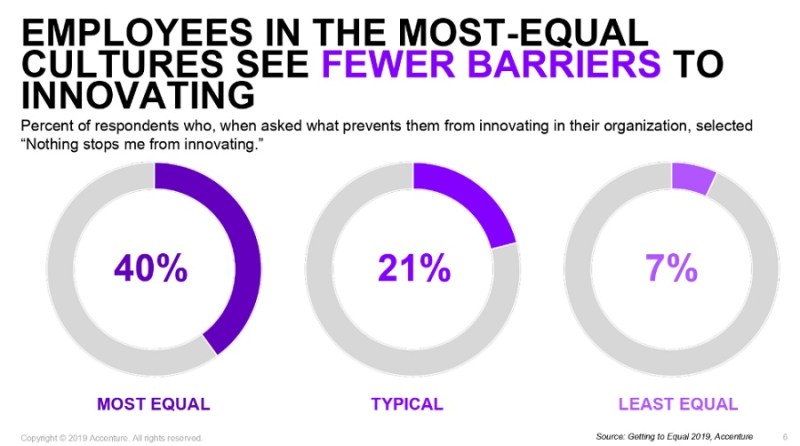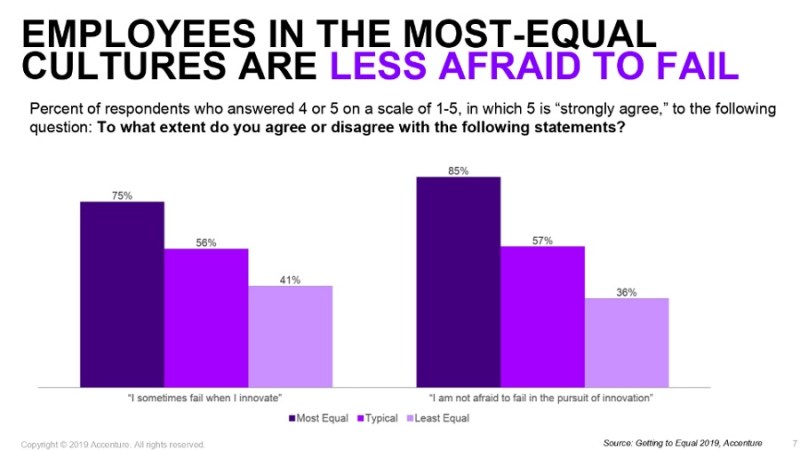Accenture said that its research shows that a culture of equality and diversity in the workplace is a powerful contributor to innovation and growth.
The company said in its research report, Getting to Equal 2019, that the mindset for innovation is nearly five times higher for employees with a robust culture of equality, where everyone can advance and thrive, than in least-equal companies.
And Accenture said that the bottom line will benefit by empowering employees. It predicted that empowering employees to innovate could raise the global gross domestic product (GDP) to $8 trillion.
“In this era of widespread disruption, businesses need to respond with continuous innovation to remain viable,” said Julie Sweet, Accenture’s CEO for North America, in a statement. “Our research provides a roadmap to creating a culture of equality, which is essential to unleashing innovation, competitiveness and growth.”
June 5th: The AI Audit in NYC
Join us next week in NYC to engage with top executive leaders, delving into strategies for auditing AI models to ensure fairness, optimal performance, and ethical compliance across diverse organizations. Secure your attendance for this exclusive invite-only event.
According to the research, the vast majority of executives around the world agree: 95 percent see innovation as vital to competitiveness and business viability. However, organizations must close the important gap the research revealed between C-suite executives and employees.
While 76 percent of executives globally said they empower employees to innovate, only 39 percent of U.S. employees agree.
Defining a culture of equality

Above: Employees in companies with a culture of equality see fewer barriers to innovation.
For example, executives appear to overestimate financial rewards, and underestimate purpose, as motivations for employees to innovate. In a culture of equality, the strongest factors underpinning innovation mindset relate to empowering employees, such as providing relevant skills training, flexible working arrangements, and respect for work-life balance, Accenture said.
Accenture’s new research is based on a survey of more than 18,000 working men and women in 27 countries, including 1,400 in the U.S.; a survey of more than 150 C-level executives in eight countries; and a model that combines employee survey results with published labor force data. It builds on Accenture’s 2018 research, which identified 40 workplace factors that contribute to a culture of equality, grouping them into three actionable categories: bold leadership, comprehensive action, and empowering environment.
This year’s research showed an empowering environment is by far the most important of the three culture-of-equality categories in driving an innovation mindset, which consists of six elements: purpose, autonomy, resources, inspiration, collaboration, and experimentation. The more people agree that they work in an empowered environment, the higher their innovation mindset scores. For instance, U.S. employees in robust cultures of equality are seven times more likely to say that nothing holds them back from innovating (44 percent vs. 6 percent).
Diversity: A critical building block

Above: Employees in most-equal companies are less afraid to fail.
Diversity is a critical building block of innovation; however, a culture of equality is the essential multiplier to help companies get there. The report notes that while the impact of diversity factors alone (e.g., a diverse leadership team and a gender-balanced workforce) is significant, when coupled with a culture of equality, the innovation mindset in U.S. companies is eight times greater.
High economic stakes
The new research found that innovative workforces equal economic potential. An innovation mindset is stronger in fast-growing economies and in countries with high labor-productivity growth. The opportunity is enormous: Accenture calculates that global gross domestic product would increase by up to $8 trillion over 10 years if the innovation mindset in all countries were raised by 10 percent.
“Accelerating equality in the workplace has never been more critical for driving innovation,” said Ellyn Shook, Accenture’s chief leadership and human resources officer, in a statement. “If people feel a sense of belonging and are valued by their employers for their unique contributions, perspectives and circumstances, they are more likely to advance and feel empowered to innovate.”


